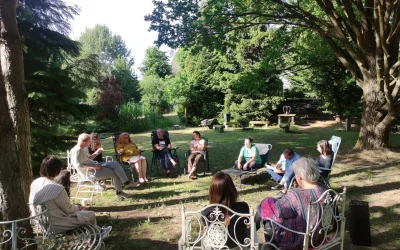
Ode to Joy
Developing Attunement through the Experience of Joy
Ode to Joy aims to increase the ability of people to experience positive emotions and to use these as evaluative perceptions, evaluative feelings and patterns of salience, to create a higher level of intrinsic motivation for learning and for recognition of their competences, both in their professional and in their personal life.
About the Project
JOY is a 30 months European project which started in November 2021, funded by the Erasmus + programme and coordinated by Rogers Foundation for Person-Centered Education.
The project activities will be implemented throughout 4 different European countries: Hungary, Italy, Austria and Germany.
The project is addressed to NEETs and Adult Educators, using experience-based methods, such as drama, bodywork, dance, music, symbolwork, storytelling, nature work, together with more formal VPL (Valuation of prior learnings) methods and CH-Q procedure, making the outcomes of non-formal and informal learning visible and recognized / validated.
PROJECT DURATION
01/11/2021 – 30/04/2024
The project is funded by the European Commission under
the ERASMUS+ programme – Cooperation Partnership in Adult Education
THE OBJECTIVES
To increase the ability of people to experience pleasant emotions like joy, happiness, contentment, pride at work and in their lives
To use these as evaluative perceptions, evaluative feelings and patterns of salience
To create a higher level of intrinsic motivation for learning and for recognition of their competences, both in their professional and in their personal life.
Target Groups
EMPTY
Adult Educators and multipliers in adult education (validation experts, counsellors, artists)
Acquiring techniques of different art forms (drama, dance, symbolwork, etc.). These tools can be used by the educators to increase their clients’ / participants’ life satisfaction, to enhance their motivation in general and specifically at the workplace, their positive attitude, their self-confidence and self-awareness; at the same time, the tools will also help strengthening the resilience of people in difficult situations.
NEETs, Adults and Young adults
People who feel disconnected from the formal educational system and having difficulties in joining the labour market. The developed instruments will be able to connect with the deeper layers of a person (invisible knowledge and skills, social roles, self-image, personal characteristics, motives, and underlying positive emotions) and use the positive emotions to make them visible and connect them with recognizable demands form companies/organisations, through valuation of prior learning.
Artists
People who want to develop their professional scope (pantomime masters, music teachers, actors, clowns, etc.), acquiring new methodologies to be used in their daily work, thus improving and enriching their professional practice and expertise.
Other Stakeholders
Policy makers in education, educational institution leaders, academics, etc., members of adult educators’ networks, to disseminate the project results and promote the use of positive psychology and recognition of competences acquired in non-formal and informal settings for strengthening employability and participation of NEETs.
Valuation of prior competencies – VPL bridging the gap between emotions and formal recognition
One of the cornerstones of the JOY methodology is based on the valorisation of previously acquired skills. The basic idea is that in order to embark on a path of personal and professional growth, one should not only rely on knowledge acquired in the formal environment...
What is JOY?
JOY is only one of the emotions – a basic emotion, however somehow it is the emotion, which all of us tend to try to reach. In our approach, joy is not synonymous with happiness. Joy is not a universal emotion, rather it is a more complex virtue. In our...
The art of storytelling
Storytelling, the art of narrating thoughts, emotions, experiences through a process of identification, is a methodology which, thanks to its characteristics, may easily fall under the criteria developed by the Joy Model. In fact, these methodologies allow the person...
Independent Theater – Roma Heroes
Summary of the interview with Rodrigo Balogh Rodrigo Balogh, director-playwright graduated as an actor in 2001 at the Shakespeare Theater Academy, Budapest. During his studies and afterwards till 2006 worked as an actor in numerous theaters, including RS9 theater. He...
How do we work with DRAMA with vulnerable groups?
Katalin Lábán’s approach The group number is 12, recommended once a week. It can be adapted from the age of 6 until the age of 99. In the Joy project we adapt for the young adults (NEETs). The facilitator is non-judgmental, non-directive, person-centered, open to the...
“Take the time for it” – Holistic Dance with Sabine Panzer
Dr Virág Suhajda My journey to the area of somatic approaches started several years ago, as a personal journey, however later it turned into a chosen professional way too. During this long journey, one year, in a Contact Improvisation Festival, in the Three Treasure...
Art as an instrument for joy
ART is the expression or application of human creative skill and imagination, typically in a visual form such as painting or sculpture, producing works to be appreciated primarily for their beauty (aesthetic) or emotional power. It usually is limited to drawing,...
EN-JOY 2.0: innovative approaches to strengthen positive emotions
Do you feel like experimenting with new approaches in non-formal education? Join the second event of the JOY project! After the great success of the March workshop at the Area Madera, we will be back on Friday April 12th, 2024 at 6 pm at...
Merging experiential approaches for diversified educational paths: the tools of the JOY method
Working in the field of non-formal education involves continuous updates on cutting-edge tools and procedures that can be used during one’s training sessions. Often, choosing a single approach for the duration of an entire educational path can be complex...
Joy and creativity: how to use them in your trainings
Reconnecting with oneself, one’s body, one’s emotions and one’s individuality, is useful and important to begin a path of awareness for the rediscovery and enhancement of one’s skills, and thus for entering or re-entering the world of work. In the past few...
EXPERIENCE JOY TO WORK ON YOURSELF AND YOUR FUTURE
The JOY project continues! During the past few weeks, we have been talking with educators and educators, artists, social workers and other professionals who work to support youth in difficult situations, including NEETs but not only, using experiential and...
JOY: EXPERIENTIAL AND CREATIVE METHODS FOR PSYCHOPHYSICAL WELL-BEING AND VALIDATION OF COMPETENCES
Reconnecting with oneself, one’s body, one’s emotions, and one’s individuality, is useful and important to begin a path of awareness for the rediscovery and valorisation of one’s competences, and thus for entering or re-entering the job market. A large percentage of...


















